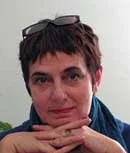CCOHR was very pleased to learn that Muriel Miguel, founding member and Artistic Director of Spiderwoman Theater and a 2013 Summer Institute instructor, received a John S. Guggenheim Fellowship. Sara Sinclair, a 2013 Summer Institute Fellow, Oral History Master of Arts alum, and current Project Coordinator for CCOHR's Robert Rauschenberg Oral History Project, conducted a public interview with Muriel, which you can watch below. In this post, she reminiscences about Muriel as a storyteller.
I met Muriel Miguel in Toronto through Native Earth Performing Arts. I was an actor participating in a week long workshop of a new play that Muriel was directing. We met again in New York at the American Indian Community House almost ten years later. I had just moved to the city, wondered whether I might run into Muriel and there she was!
We got to chatting and I told that I was in the city studying oral history. She was interested in hearing more about my studies and in telling me about Spiderwoman Theater’s latest production, a play based on real Native American women’s experiences of violence. Muriel thought there might be a way for us to work together and I was excited about that and just so happy to reconnect.
Muriel is a great storyteller. She is fun, dynamic, wise and just so fully and richly herself. She certainly doesn’t need an interviewer to draw her out! I saw my role as more about providing the structure for her to best share her story with the Summer Institute Fellows. I was proud to be able to facilitate our time together so that she could share her experience as an “Urban Indian” growing up in Brooklyn, New York, a narrative unfamiliar and maybe even unimagined by most.
I love Muriel, and I love that she is a part of my community in New York. We don’t speak often but somehow she always knows when to call and I’m always so moved by her love and humor when she does. I had a son in June and the night before I went into labor, Muriel called to ask how I was. She told me about how she walked her way through her own labor. Her stories give me strength.




